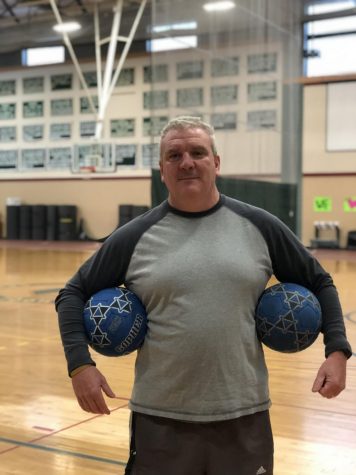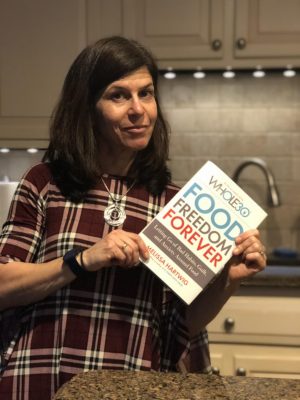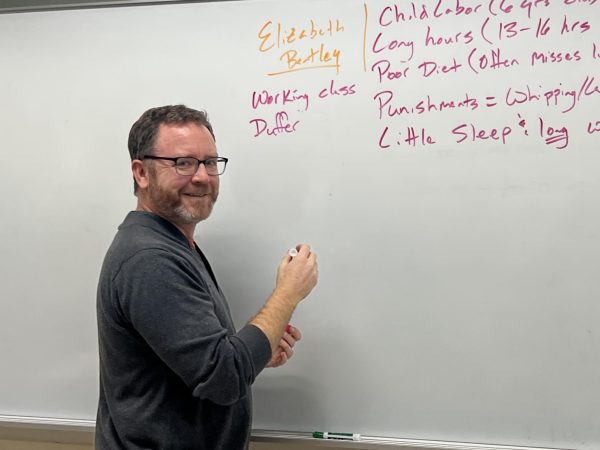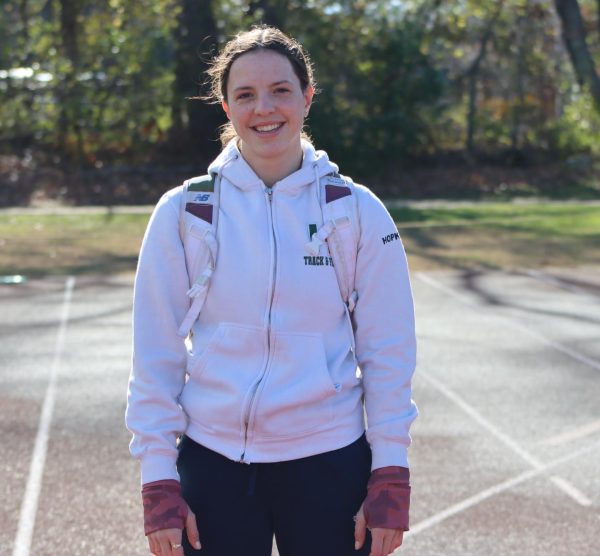Dieting in the New Year
Every new year brings with it the resolutions of many. As usual, many people begin their year with a new health goal, among them diets that promote eating wholesome foods.
A diet that has taken 2018 by storm is the Whole30 program, which the website Daily Burn describes as a “viral health movement [that] encourages followers to cut alcohol, sugar, grains, legumes, dairy and additives from their diet for 30 days straight — with zero cheat days.”

Sophie Schneider getting her 10 minutes of exercise in on a rowing machine.
Many people chose this diet as a way to start off their year right, among those people being senior Sophie Schneider.
“I wouldn’t call it a diet, I’d call it a lifestyle change,” Sophie Schneider said. “The program I’m doing is a challenge. So you can compete on a team, against other people, or you can just compete against yourself.”
Schneider did a more rigorous version of the Whole30, the Whole Life Challenge. While the diet remains the same from Whole30 to the Whole Life Challenge, additional daily habits are added, such as stretching, wellbeing, water intake amount, exercise amount, and getting a certain amount of sleep.
While many fad diets are controversial among wellness professionals, this diet seems to defy that backlash.
Karen Renaud, Wellness Coordinator for Hopkinton High School, said, “I am a big believer in eating as little processed food as possible. In wellness, we use this term ‘the closest to the ground as possible,’ so things in their natural state definitely are best for our bodies.”
Michael Hooker, Wellness Teacher at Hopkinton High School, agreed with Renaud on how this diet is beneficial to our health, as well as ways it can positively affect the body.

Michael Hooker before teaching his Recreational Team Sports class in the Athletic Center.
“You should eat consistently healthy and manage your weight that was as opposed to severe restrictive calorie diets,” Hooker said. “Eat[ing] consistently whole foods and healthy on a regular basis and that helps you feel better, helps you maintain healthy blood sugar levels, control weight, and that stuff.”
Additionally, a fourth-grade teacher at the Fay School in Southborough, Gabby Giordano chose to start the Whole30 diet to ring in the new year.
Giordano went on the diet partially because it is an annual challenge for the gym she goes to. Again, Giordano’s diet included daily challenges, like getting enough sleep, exercising, drinking more water, and portion control.
“I would say the diet was a relaxed Whole30. The exceptions were we could have grass-fed butter, and naturally occurring sugars, but other than that just whole, unprocessed foods,” Giordano said.
With most diets, the question of sustainability arises. There seemed to be no disagreement that this diet is easily sustainable and should be sustained.
“I think this is a very healthy and sustainable diet,” Renaud said. “It takes an effort like everything else, but eating whole, healthy foods is absolutely sustainable. I think we would all feel better if we would just make that little extra effort.”
Hooker echoed Renaud on the diet’s sustainability.
“It’s absolutely sustainable. That’s how everyone should be eating daily,” Hooker said. “I also think the habits this diet encourages should be incorporated into everyone’s lives on a regular basis.”
Sticking to a strict diet can be frustrating, but Schneider and Giordano both urged that they have learned to not get down on themselves if they cheat.
Giordano said, “It used to be if I ate something then I’d be like, ‘The whole day is ruined, I might as well just eat, eat, eat, eat, eat.’ Now it’s like, ‘no, I’m going to have that but I’m not going to have anything else’, I just feel like I’m in more control.”

Gabby Giordano with her Whole30 book.
“I don’t think that cheating or messing up new years resolutions means you broke it. It just means you need to keep on trying because one mistake isn’t going to define your whole new year. I think that was something I needed to learn while I was doing the challenge. I allowed myself cheats but didn’t let myself feel bad after having them,” Schneider said.
Schneider commented on ways this diet has made her feel better, reinforcing her to continue carrying the diet out despite it having been a new year’s resolution.
“It was a new year’s resolution,” Schneider said. “But with that being said, I definitely do plan on doing a lot of the things regardless of whether I’m on this challenge. Now that [the challenge] has ended, I want to stretch every night because I feel better, and I want to drink more water because I feel better. These are really easy things that just make us feel better and like worrying about sleep and stuff I’m definitely going to continue to do.”
Giordano reiterated that this diet has improved how she feels on a day-to-day basis, and how it will remain as a part of her daily life.
“As a gym, it’s just kind of a new years thing that we do. But now, I don’t really want to stop. I was getting Restless Leg Syndrome at night, and I don’t have it anymore. One night I had sugar again and it came back. It was funny, the diet was over, and that whole night it came back. I didn’t even realize I didn’t have it anymore until I had it again.”














